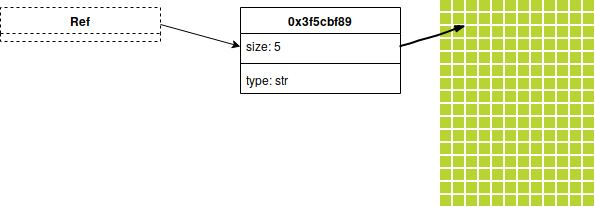Rápida Introdução ao Rust
- Júlio Biason
- https://functional.cafe/@juliobiason
- julio.biason@pm.me
- http://presentations.juliobiason.net
História
- Criada em 2006 por Graydon Hoare.
- Patrocinada pela Mozilla em 2009.
- Versão 1.0 em 2015.
- Versão atual: 1.35
- Objetivo: Criar uma linguagem rápida mas com seguraça de memória.
História

Basic (com números e estruturado), dBase III Plus, Clipper, Pascal, Cobol, Delphi (ObjectPascal), C, C++, ActionScript (Flash), PHP, JavaScript, Python, Objective-C, Clojure, Java, Scala, Rust.
(Lisp, Haskell, Ruby)
Meu Primeiro Rust
fn main() {
println!("Hello, world!");
}
Meu Primeiro Rust
Tempo para gerar esse código:
0 segundos
cargo init
Cargo
"Cargo is the Rust package manager"
"Cargo downloads your Rust package’s dependencies, compiles your packages, makes distributable packages, and uploads them to crates.io, the Rust community’s package registry."
De Volta Ao Rust - Static Typed
fn main() {
let a: u8 = 2;
println!("{}", a);
}
Mas De Volta Ao Rust
fn main() {
let a = 2u8;
println!("{}", a);
}
Mas De Volta Ao Rust
fn main() {
let a = 2;
println!("{}", a);
}
De Volta ao Rust - Pattern Matching
fn factorial(i: u64) -> u64 {
match i {
0 => 1,
n => n * factorial(n-1)
}
}
De Volta ao Rust - Returns are not necessary
fn is_pred(i: u64) -> Bool {
if i % 2 == 0 {
True
} else {
False
}
}
De Volta ao Rust - Returns are not necessary
fn is_pred(i: u64) -> Bool {
i % 2 == 0
}
De Volta ao Rust - Enums
enum IPAddr {
IPV4,
IPV6
}
Mas De Volta ao Rust
enum IPAddr {
IPV4(String),
IPV6(String)
}
Mas De Volta ao Rust
let home = IpAddr::IPV4(String::from("127.0.0.1");
match home {
IPV4(ipv4_address) => println!("IPv4 addr: {}", ipv4_address),
IPV6(ipv6_address) => println!("Ipv6 addr: {}", ipv6_address),
}
De Volta ao Rust - No OO
No OO
struct MyStruct {
a_field: String,
r_a: [2u64; 10],
}
No OO - But "functions in structs"
impl MyStruct {
fn first_element(&self) -> u64 {
self.r_a.get(0)
}
}
No OO - But Traits
trait Summarize {
fn summarize(&self) -> String;
}
No OO - But Traits
impl Summarize for MyStruct {
fn summarize(&self) -> String {
self.a_field
}
}
No OO - But Generics
fn make_summary<T>(summarizable: T) {
T.summarize()
}
No OO - But Generic Traits
fn make_summary<T>(summarizable: T)
where T: Summarize
{
T.summarize()
}
E Aquela "Segurança de Memória"?
1. No Null Pointers
fn may_not_exist(value: Option<String>) {
match value {
Some(the_string) => println!("I got a string! {}", the_string),
None => println!("I got nothing")
}
}
2. No Shared Memory
fn main() {
let a = String::from("A reference to a string in the code section copied to the stack");
let b = a;
println!("The string is: {}", a);
}

2. No Shared Memory
fn main() {
let a = String::from("A reference to a string in the code section copied to the stack");
let b = &a;
println!("The string is: {}", a);
}

presente := Presente { ... }
canal <- presente
presente := Presente { ... }
canal <- presente
presente.abrir()3. Immutable variables by default
fn main() {
let a = 3;
a = 5;
}
Error Control
enum Result<T, E> {
Ok(T),
Err(E),
}
match File::create("something.txt") {
Ok(fp) => fp.write_all(b"Hello world"),
Err(err) => println!("Failure! {}", err),
}
Compilador Chato mas Amigável
fn main() {
let a = 2;
a = 3;
println!("{}", a);
}
3 | let a = 2;
| -
| |
| first assignment to `a`
| help: make this binding mutable: `mut a`
4 | a = 3;
| ^^^^^ cannot assign twice to immutable variable
3 | let a = 2;
| -
| |
| first assignment to `a`
| help: make this binding mutable: `mut a`
4 | a = 3;
| ^^^^^ cannot assign twice to immutable variable
3 | let a = 2;
| -
| |
| first assignment to `a`
| help: make this binding mutable: `mut a`
4 | a = 3;
| ^^^^^ cannot assign twice to immutable variable

A linguagem mais amada segundo o StackOverflow Survey 2019
... pelo 4⁰ ano seguido.

E agora?
- Júlio Biason
- https://functional.cafe/@juliobiason
- julio.biason@pm.me
- http://presentations.juliobiason.net